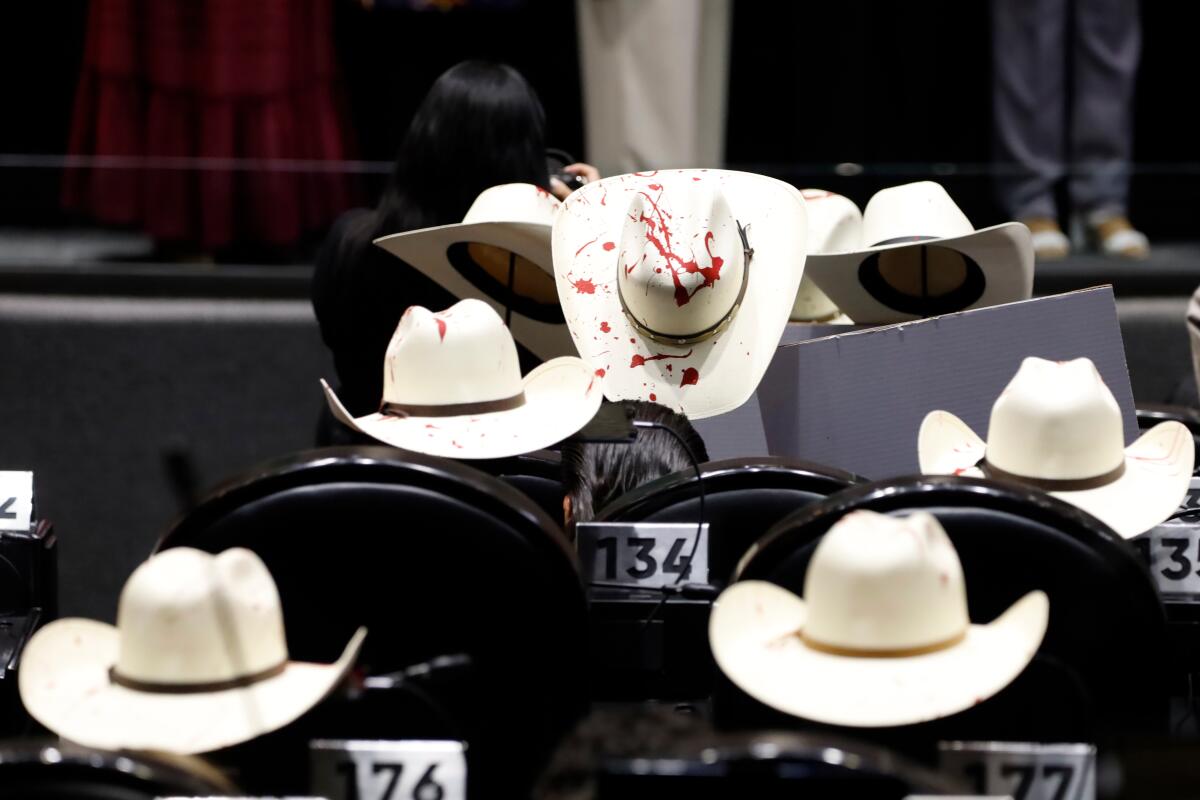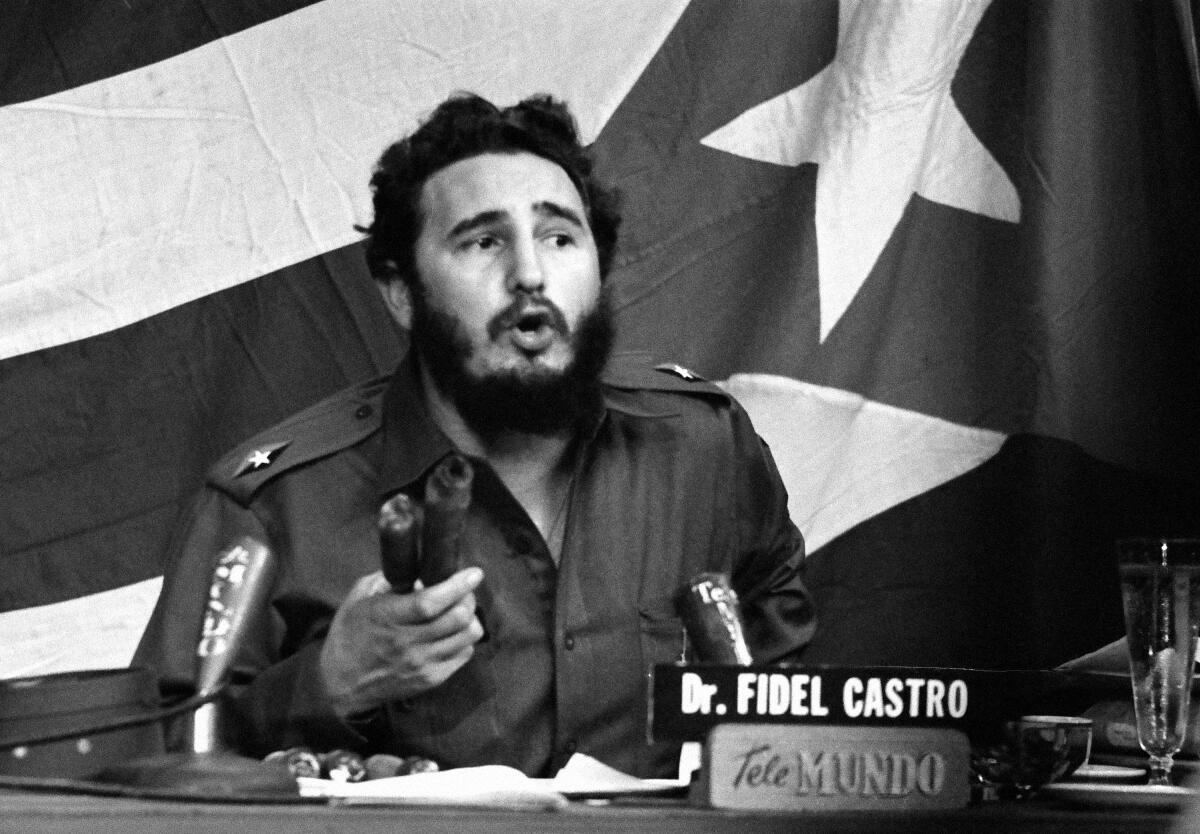MEXICO CITY — Carlos Manzo blazed a maverick path as he battled both cartels and what he called skimpy federal support for his crusade against organized crime in his hometown of Uruapan, in western Mexico.
The “man with a hat,” after his signature white sombrero, was an annoyance to the power structure in Mexico City, but beloved among many constituents for his uncompromising stance against the ruthless mobs that hold sway in much of the country.
“They can kill me, they can abduct me, they can intimidate or threaten me,” the outspoken Manzo declared on social media in June. “But the people who are sick of extortion, of homicides, of car thefts — they will demand justice.”
He added, “There is an enraged tiger out there — the people of Uruapan.”
That rage was on dramatic display last week, as tens of thousands marched through the streets of Uruapan and elsewhere in violence-plagued Michoacán state to denounce the slaying of Manzo, 40. He was gunned down Nov. 1 amid a crowd of revelers, including his family, at a Day of the Dead celebration, in a killing that reverberated nationwide and beyond.
The assassinations of other public figures in recent years have also triggered outrage and dismay in the country, but Manzo’s death has unleashed something else: A divisive aftermath that has seen many questioning Mexico’s very ability to confront the rampaging cartels in places like Michoacán, where organized crime has a forceful grip on government, the economy and people’s daily lives.
“This structural control of organized crime is deeply worrying for the entire country,” said Erubiel Tirado, a security expert at the Iberoamerican University in Mexico City. “It speaks of a crisis of legitimacy in terms of the government’s ability to function.”

Legislators from the Institutional Revolutionary Party (PRI) placed hats painted like blood on their seats in condemnation of the murder of Uruapan Mayor Carlos Manzo during a session in the Chamber of Deputies on Nov. 4, 2025, in Mexico City.
(Luis Barron / Sipa USA via Associated Press )
Mexico, wrote columnist Mariana Campos in El Universal newspaper, “is fractured into zones where criminals set the rules, administer justice, charge taxes and decide who can be the mayor, who can be a businessman.”
Less than two weeks before Manzo’s killing, police in Michoacán found the battered body of Bernardo Bravo, a renowned leader of regional lime growers who had pushed back against cartel extortion demands. Bravo was shot in the head and his corpse showed signs of torture, authorities said.
For months, the government of President Claudia Sheinbaum has rolled out statistics showing nationwide reductions in homicides and other offenses, along with the arrests of hundreds of organized crime figures — among them dozens expelled to face justice in the United States.
Yet polls consistently show many Mexicans remain unconvinced. The death of Manzo — who cut a national reputation by insisting that officials coddled criminals — only heightened a pervasive sense of vulnerability, especially in places like Michoacán.
The picturesque region of verdant hillsides, pine-studded mountains and wild Pacific coastline has long been a hub of cartel violence. In 2006, then-President Felipe Calderón chose Michoacán as the place to declare Mexico’s ill-fated “War on Drugs.”
That came a few months after an especially macabre incident in Uruapan: Cartel gunmen tossed five severed heads onto a nightclub dance floor.
During the War on Drugs, the military was deployed to combat cartels, but the strategy backfired, significantly escalating violence nationwide and raising concerns about the militarization of the country and the trampling of human rights.

Relatives pull the coffin of Mexican journalist Mauricio Cruz Solis during his wake in Uruapan, Michoacan state, on Oct. 30, 2024. Cruz was shot dead Oct. 29 in western Mexico, a local prosecutor’s office said, in a part of the country hit hard by organized crime.
(Enrique Castro / AFP via Getty Images)
According to many in Uruapan and across the country, things have only gotten worse since then.
“Broadcast it to the entire world: In Mexico the narco-traffickers govern,” said Arturo Martínez, 61, who runs a handicraft shop in Uruapan, a city of more than 300,000 at the heart of Mexico’s multibillion-dollar avocado industry. “What can any average person expect if they kill the mayor in front of his family, in front of thousands of people? We are completely at the mercy of the criminals.”
It is a frequently voiced viewpoint that meshes with President Trump’s comments that cartels exercise “total control” in Mexico — a charge denied by Sheinbaum, though others say the breakdown in Michoacán exemplifies a broader lack of control.
Uruapan “has become a mirror of the country, a microcosm where the ability to govern goes off the tracks, [and] fear substitutes for the state,” Denise Dresser, a political analyst, told Aristegui Noticias news outlet.
Manzo, an independent, broke with Sheinbaum’s ruling Morena party more than a year ago and charged that the central government had ignored his pleas for additional police firepower and security funding to confront organized crime.
Following the mayor’s slaying, Sheinbaum ruled out a return to the militaristic War on Drugs, which cost tens of thousands of lives and, according to Sheinbaum and other critics, did little to halt drug trafficking.

Police officers stand guard as protesters demonstrate against the assassination of Uruapan’s mayor at the Government Palace in Morelia, Mexico, on Nov. 3. The Mexican government reported Nov. 2 that the mayor of Uruapan, Carlos Manzo, who was killed the previous night during a public event in the western state of Michoacan, had been under official protection since December.
(Jordi Lebrija / AFP via Getty Images)
Manzo was the latest of scores of Mexican mayors and local officials assassinated in recent years, as cartels seek to control turf, trafficking routes, police departments and municipal budgets, while also bolstering extortion schemes and other rackets. Manzo’s death stood out because of his provocative media presence, as he demanded that authorities beat criminals into submission — or kill them.
“In many places criminal groups control the police chiefs, the local treasuries, the mayors,” noted Víctor Manuel Sánchez, a professor at the Autonomous University of Coahuila. “Then there are mayors like Carlos Manzo who seek to break this circle — and they end up dead.”
Sheinbaum assailed opposition critics who have blamed what they call her lax policies for the killing. She condemned the “vile” and “cowardly” attack on Manzo, and vowed to bring the killers to justice.
The 17-year-old gunman who fatally shot Manzo was killed at the scene, according to police, who say two other suspects were arrested. Authorities call the operation a well-planned cartel hit, though there has been no official confirmation of which of the many mobs operating in the area was responsible. Also still unclear is the motive.
In the wake of the mayor’s killing, the president is unveiling a “Plan Michoacán” in a bid to improve security. Many are skeptical.
“It’s the latest of many such plans,” noted Tirado of the Iberoamerican University. “None have worked.”
Taking over as mayor of Uruapan was Grecia Quiroz, the widow of Manzo, who vowed to continue her husband’s fight against cartels. As Quiroz lifted her right hand last week to take the oath of office, she cradled her husband’s trademark white hat in her left arm.
“This hat,” declared the new mayor, “has an unstoppable force.”
White hats have been a common sight at demonstrations denouncing his death, and a white hat graced Manzo’s coffin at his funeral.
His widow’s well-choreographed swearing-in amid extra-tight security did little to alter the predominant mood of anguish and gloom in Uruapan. Hope is a commodity in short supply for the town’s despondent and fearful residents.
“It’s the narcos who run things here, not the mayor, not the president,” said Martínez, the shop owner. “Carlos Manzo only wanted to protect his people. And look what happened to him.”
Times staff writer Kate Linthicum and special correspondent Cecilia Sánchez Vidal in Mexico City contributed to this report.



